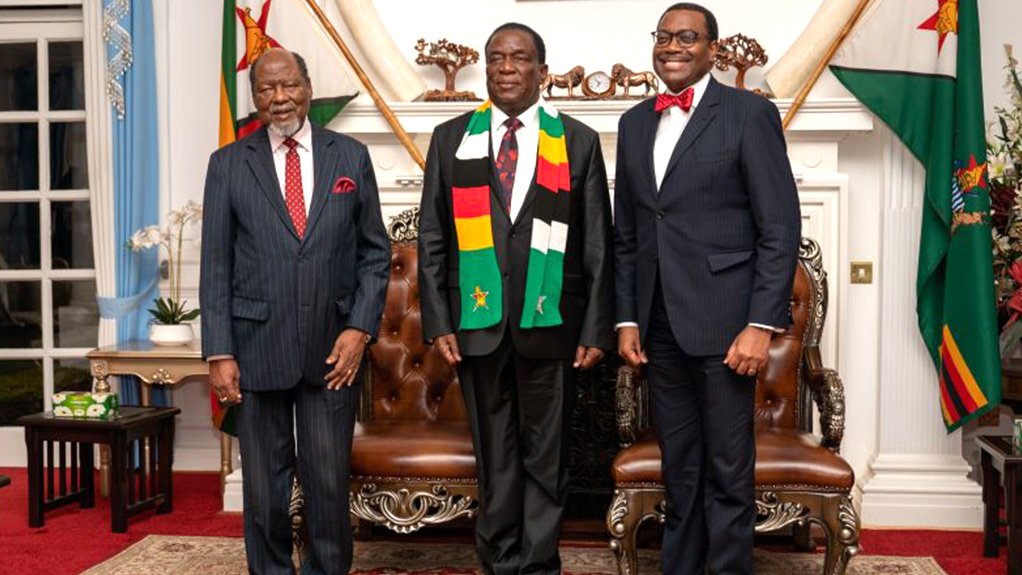Zimbabwe President Emmerson Mnangagwa has promised development partners and creditors that his government will implement reforms necessary for resolving the country’s nearly $8.3-billion debt and arrears.
He was speaking during a high-level debt resolution forum, held on May 15 in Harare. African Development Bank (AfDB) president Dr Akinwumi Adesina and former Mozambique President Joachim Chissano also addressed the forum, which was attended by government officials, development partners, private sector players, former farm owners and civil society organisations.
Mnangagwa claimed that “in spite of the challenges associated with the debt overhang and further exacerbated by the albatross of the illegal economic sanctions, Zimbabwe is realising key milestones towards moving our country forward for the good of our people”.
The key reform pillars for Zimbabwe’s implementation programme include governance reforms, land tenure reforms, compensation of former farm owners and the resolution of bilateral investment protection agreements.
UNSUSTAINABLE DEBT
Adesina expressed deep concern about the country’s excessive debt.
“Zimbabwe cannot run up the hill of economic recovery carrying a backpack of debt on its back. It is time for a comprehensive debt arrears clearance and debt resolution for Zimbabwe.
“Economic sanctions are driving Zimbabwe further into unsustainable debt. The debt itself is not as debilitating as the arrears on the debt, since the country cannot access international concessional financing or other revenue or less expensive financing to pay down its debt obligations,” he explained.
The majority of Zimbabwe’s combined $8.3-billion bilateral and multilateral debt is accounted for by arrears. The country currently publishes public debt statistics and debt payment information to maintain transparency and accountability.
“There is a need to nurture the trust and goodwill which continues to grow among all parties,” Mnangagwa said.
He added that the country’s sustainable economic recovery would require augmentation by a comprehensive arrears clearance and debt resolution process backed by international financial institutions and the international community at large.
Chissano said Zimbabwe’s situation was hurting the region.
“The crisis in the country is having terrible consequences for the region, as Zimbabwe lies at the heart of Southern Africa. Many regional infrastructure development plans, including roads, railways and power transmission lines have been brought to a standstill, as they have to run through the country. The continental free trade area is also undermined by the situation prevailing in Zimbabwe,” he said.
LAND REFORMS AND COMPENSATION
On land reforms and compensation, Adesina said the AfDB was working with the government of Zimbabwe to develop innovative financial instruments and structures that can be used to front-load the mobilisation of $3.5-billion for compensations promised in 2020.
This compensation was promised to about 4 500 white farmers whose land was forcefully and, in many cases, violently expropriated since 2000. This was done under the direction and incitement of the Zimbabwean government to resettle black families – a move that many believe was the catalyst for rapid and extreme economic decline and food shortages. The promised compensations are part of the new administration’s efforts to resolve one of the most divisive policies of former President Robert Mugabe.
Adesina cautioned against further delays in delivering the promised compensation, as this would continue to erode trust and confidence.
Adesina appealed to development partners “to work together on this proposed structure which can help leverage capital markets to fund compensations without additional debt for Zimbabwe”.
The AfDB head commended the government for its decision to make land titles available to enhance the security of commercial farmland.
“These would be for 99-year leases, which are also commercially viable, bankable and transferable,” he recommended.
FREE AND FAIR ELECTIONS
Regarding electoral reforms, Mnangagwa told stakeholders that the county had put in place mechanisms to guarantee peaceful, free, fair and credible elections scheduled for August this year.
Mnangagwa, who is a former Mugabe lieutenant and seized power following a November 2017 coup, won the 2018 election with 50.8% of the vote.
Moreover, the ruling Zanu-PF party won a two-thirds majority of 149 seats in Parliament’s lower house, permitting it to amend the Constitution at will.
The results of that election, however, were widely disputed, with international election observers having pointed to irregularities such as widespread voter intimidation and food aid distribution only for Zanu-PF loyalists.
“My government stands committed to consolidating constitutionalism, rule of law, good governance and protecting constitutionally enshrined rights and freedoms,” Mnangagwa told the forum.
Regarding the upcoming elections, Adesina said the people of Zimbabwe and the international community would be watching very closely.
“The full weight of re-engagement with the international community will depend on this. It will also depend not just on the election, but the entire electoral process that guarantees a credible election,” Adesina urged.
He further emphasised the need for stakeholders to ensure there was concrete and measurable progress on the Zimbabwe Democracy and Economic Recovery Act, or Zidera, which is critical for re-engagement with the US, and could be used to support advocacy for the lifting of select sanctions imposed by the US Congress.
Adesina and Chissano visited the US in early May to meet with leaders in the US Congress, Treasury Department, State Department and other US agencies.
"It was very clear that there is support for this high-level dialogue, and a hope that it will translate into concrete and measurable progress on the ground to inform a consideration of the lifting of the sanctions under Zidera,” Adesina said.
In December last year, the Zimbabwean government established a Structured Dialogue Platform with all creditors and development partners, to institutionalise structured dialogue on economic and governance reforms to underpin the arrears clearance and debt resolution process.
EMAIL THIS ARTICLE SAVE THIS ARTICLE ARTICLE ENQUIRY
To subscribe email subscriptions@creamermedia.co.za or click here
To advertise email advertising@creamermedia.co.za or click here











